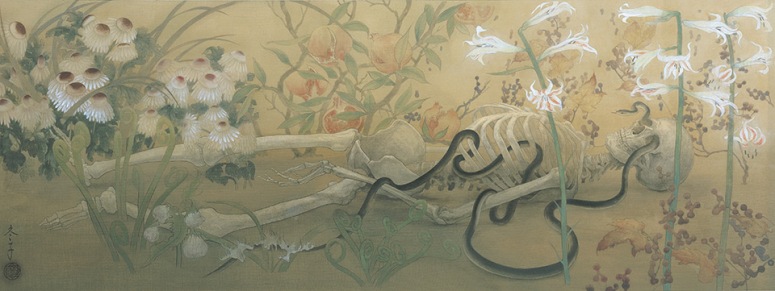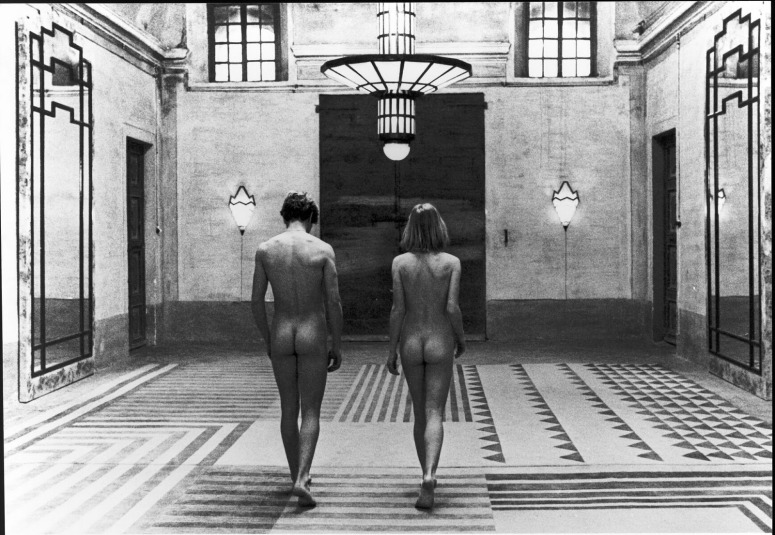For me, turning away from the world…from the truth of bodies is shameful.
-Georges Bataille
The humanism of the movement known as transhumanism couldn’t be more against the notion of the human, yet they do care about a body: the social body. In the West there is a long history public health campaigns in an effort to keep this body healthy (also political bodies, Chris Hedges famously called the Black Bloc activities a cancer of the Occupy movement), and exploitation films famously got through censors by disguising the transgressions as morality tales. Dwain Esper, the prince of exploitation and a true nod to the barker of the sideshow, knew the ins and outs of how to separate a mark from their money.
Esper’s first feature movie, Seventh Commandment (1932), was a torrid tale of the evils of adultery. It featured documentary footage of a Caesarian birth, dramatic interludes depicting transvestites, and bodies ravaged by syphilis or completely nude. Even though the ultimate message is about staying faithful to one’s partner, a high-ranking official in the Production Code Administration found the film “vile and disgusting”.

Transhumanists, like movie censors, want a sanitized society, for those privileged enough to benefit. Soon there will be no need to defecate or piss or fuck unless you want to do it in virtual reality. Rather than having a sensual tactile relationship to other people and the world around us, these people would rather you eat a pill to fill your belly than a piece of sticky fruit, as if that’s any substitution. In the end is just another ideology that excuses whatever keeps the human species ticking away and the trains running on time.
Both the Marquis de Sade and Pier Paolo Pasolini “sought to discover means to finally detonate the narratives and foundations of social power systems” through their transgressive narratives. Pasolini’s masterpiece Salò is a retelling of de Sade’s 120 Days of Sodom set in the mid-1940s at the end of Mussolini’s reign that presents a visual feast of human cruelty. He had direct experience with the visceral brutality of war, his father had been a professional fascist soldier and he had seen the final product of the massacres.

Pasolini wanted Salò to be not just his final film, (which it was to become after his brutal murder), but the final film of all humanity images of the “structures of cruelty and of the sexual origins of human atrocities and massacres that would form a kind of malign legacy, left for any nonhuman species that in the future might want to look upon the memories and obsessions of the human race.” The idea of the “final film” was explored by other directors during the violence saturated world of the late 1960s and 1970s and was much closer to home. The transformation of Times Square is an example. You could look out of your window and see the sordid actions of man. Now anything that unveils the ugliness or base is disguised by commerce. But we know what is behind this illusory mask of civilized people who are so clean.


I recently came across an article written by Olga Khazan about the transhumanist presidential candidate, Zoltan Istvan. Like other transhumanists, he wants to not only extend human life, but eliminate death entirely. Any contagion to the body, including the social body, would be eliminated if Khazan and other transhumanists and tech giants would have their way. We can already see how far surveillance and warfare has come. Of course they will talk about eliminating hunger, poverty and so forth. Transhumanists have yet to reconcile the fact that their utopia is hardly a utopia for the people who still mine the materials for this world, or clothe our shameful naked bodies. Ultimately they want to be human, but without the despair, sickness and the ultimate end of our journey that is a pile of rotting flesh given as a sacrifice to the maggots and worms, and ultimately the earth, that goes with being animal.

Istvan was working as a National Geographic reporter in Vietnam when he almost tripped a landmine (another reminder of human atrocity). Instead of serving as a reminder of mankind’s brutality he was so shaken by the experience it invigorated his faith in technology as the savior of mankind (ironically it was another piece of human technology that almost shred him to pieces).
Istvan and other techno-utopians believe death is the “great enemy” of mankind, not just the enemy of the individual. The social body I believe the great enemy of mankind is itself and societies hubris, this has been proven time and time again and only somebody who fears death and the wild would call it an enemy and not a blessing.


“Japanese culture has become too clean. Our five senses are too blunt.” -Fuyuko Matsui

